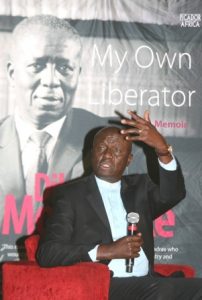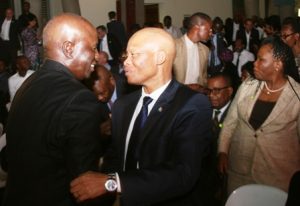
Part of a whirlwind of events the Pan Africanist stalwart has had to navigate by crisscrossing Rand locations such as his hometown of Atteridgeville, Pretoria and Sandton for appearances centered around the tome’s release as well as a dinner in his honour hosted by the Pretoria Bar Council– the occasion at the country’s highest court on the hill was graced by the ex-Robben Islander’s family who numbered his wife, Khabonina, brother, Tiego, Chief Justice, Mogoeng Mogoeng, Justice Edwin Cameron, former fellow prisoner, Gaby Magomola, General Bantu Holomisa, Dr Mosibudi Mangena, Moeletsi Mbeki, IEC Vice-Chairperson, Terry Tselane, Standard Bank Chairman, Thulani Gcabashe, Sunday Times columnist, Barney Mthombothi, Mathata Tsedu, Moss Mashishi, Peter Vundla, advocates Dumisa Ntsebeza and Dali Mpofu, in addition to others from various walks of life.
Before eNCA journalist, Iman Rappetti would engage in banter with the former chairman of Telkom, Metropolitan Life and African Bank Investments, his kid brother, Tiego was accorded an opportunity on the podium to offer some reflections on his brother’s life thus far and had the audience in mirth when he pointed out that unto him befell the singular dishonor of speaking at a book launch whilst he himself was not published.
Friend of longstanding, Peter Vundla inferred to Moseneke as a chapter and drew attention to how his utterances at his 60th birthday party have now entered the annals of infamy with regard to how they rubbed the present regime the wrong way.
Judging by the laughter Vundla’s remarks elicited, the well documented incident, howbeit carrying career stinting implications as a consequence of a fallout with the Zuma administration – seem to have now assumed a status akin to cocking a snoot at Big Brother, within their esteemed circle.
South Africa’s Chief Justice, Mogoeng Mogoeng had the attendees in rapture with multi-layered remarks touching on biographical acknowledgments such as how, like Mandela and Tambo did, Moseneke also realized practicing out of his own law firm [the period he was a partner at law firm, Maluleke, Seriti and Moseneke] – to raising the applause to a crescendo by making the listeners appreciate the absurdity of the apartheid jailers through forcing a then teenage boy to behold the nakedness of adult fellow inmates on Robben Island’s bath areas.
“It is not what the ruling party wants, but what our people want!’’ cautioned Mogoeng. He thundered on to declare that the land issue must be properly addressed as well as delivering the following line: ‘’White people need to liberate themselves too!’’ Elsewhere, he inevitably lauded Moseneke as a pioneer of the business sector.
Regarding the centerpiece of the gathering, the book title, My Own Liberator, erstwhile president Thabo Mbeki observed it as a memoir of the fascinating account of the formation of the cadres who would have the responsibility both to help liberate our country and attend to its reconstruction and development.
In fact it is revealing that Mbeki even has any association with a personal matter regarding Moseneke as, for the longest time ever, the perception has held that the ANC government had been deliberately overlooking him from ascending the ultimate position possible on the land’s highest court for any number of reasons – with chief amongst them being that it was unfathomable for the ruling party to entrust an institution representing the last call in the litigatory hierarchy in the custody of a figure whose allegiances lay with the rival Pan African Congress.
At the self-same memoir launch in Sandton just over a fortnight back, Mbeki had seemed to set the record straight in as far as the prevalent view by claiming that his recalling as president occurred while he was planning to recommend the then deputy chief justice as the country’s top judge.
Ensuing time of course entailed the moment of DM’s, as he is fondly referred to by his close circle, 60th birthday party where he voiced his disapproval of the state of the nation under Jacob Zuma’s leadership and the resultant fallout which some came to attribute as ultimately having a bearing on his being denied a promotion – a natural progression given his position and the period he served on the Constitutional Court Bench.
Fast-forward to now as he eventually assumed his place on the podium tete-a-tete with the award-winning Rappetti in a wowing sweeping evening gown, for an intimate conversation based mostly on contents of his memoir. Asking himself as much as the audience in the second person, he ambitted, ‘’fellow justices, Edwin Cameron and Albie Sachs had already written books – you write in your sixties?’’ “We can’t outsource our duty to liberate ourselves’’, he quoted Robert Sobukwe.
With Rappetti largely jabbing back by drawing him on light-hearted anecdotes extracted from his memories now committed to paper such as romantic moments entailing how he wooed his now wife as well as aspects of his mother’s no-nonsense stance – Moseneke type-cast himself as a little fellow amidst a large uprising who got incarcerated into darkness whilst fantasizing about ideals.
The thoroughly enthralled crowd listened on as he recalled how Afrikaner warders on Robben Island insulted their morale by suggesting, Nkosi Sikelel’ Afrika se moer! – ambling on to describe the torture and beatings meted out in gaol.
He touched on the indecent subject of the Tauza [a drill which required a prisoner to do some jiggle of sort while naked so as for warders to satisfy themselves that they were not concealing any foreign object inside their rectums] and pointed out to the cultural inappropriateness of having to share the prison’s shower areas with the elderly Zeph Mothopeng and Walter Sisulu and carried on to tell of a hunger strike inmates once participated in and remembered the late Steve Tshwete suggesting that they catch guinea fowls for supplication.
When a question was thrown at the audience as to whether they remembered where they were and doing when the National Party decided to turn its back on the costly apartheid ordeal, the UDM’s Bantu Holomisa offered that he was still a dictator of a Bantustan.
Getting back the baton once more, Moseneke then assumed a scathing tone whilst asking, ‘’Was it all in vain?’’ ‘’We have saddled an underclass.’’
He furthermore pointed out the increase in the populace whilst others steal from the fiscus and hitherto mentioned the ever-increasing millions of South Africans over-doled.
Borrowing a Letta Mbulu song title, he put it to the listeners that it is not yet ‘uhuru’.

The book, he offered, was about personal urgency to collective urgency. Critical of the shenanigans coming out of parliament, he spoke of it as being supposed to be the guardian of our democracy and flourished with a punchline that none of the democratic oversight bodies ought to be misused.
It was refreshing to hear Moseneke drive his views and heartening to realize that in spite of his achievements, relative social security and age, that passion for his country still drove him and his ilk continues caring enough for the present and foreseeable future – especially as observed amidst the graft and selfishness which seem to be the order of the day in a 22 year old republic.
Still looking fit as a fiddle for a retired figure in his sixties, Moseneke was back at his hunting grounds laden with an exemplary biography and resume which reads of a 15 year old being incarcerated on Robben Island for 10 years, obtaining a BA in English and Political Science, a B. Iuris and LLB through Unisa, starting his career in 1976 as an attorney’s clerk, practicing as an attorney and an advocate until getting silked, serving the Constitutional Court Bench from 2002 and appointed deputy chief justice in 2005 and taking a six-year break from the legal world to pursue a corporate career which saw him assuming the chairmanships of Telkom, Metropolitan Life and African Bank Investments.
A couple of weeks before at a dinner in his honour hosted by the Pretoria Bar Council, Moseneke was lauded as a man who walked from Robben Island to the Constitutional Court and someone who sacrificed his youth; so the youth of today can enjoy the fruits of freedom that was brought by that sacrifice.
